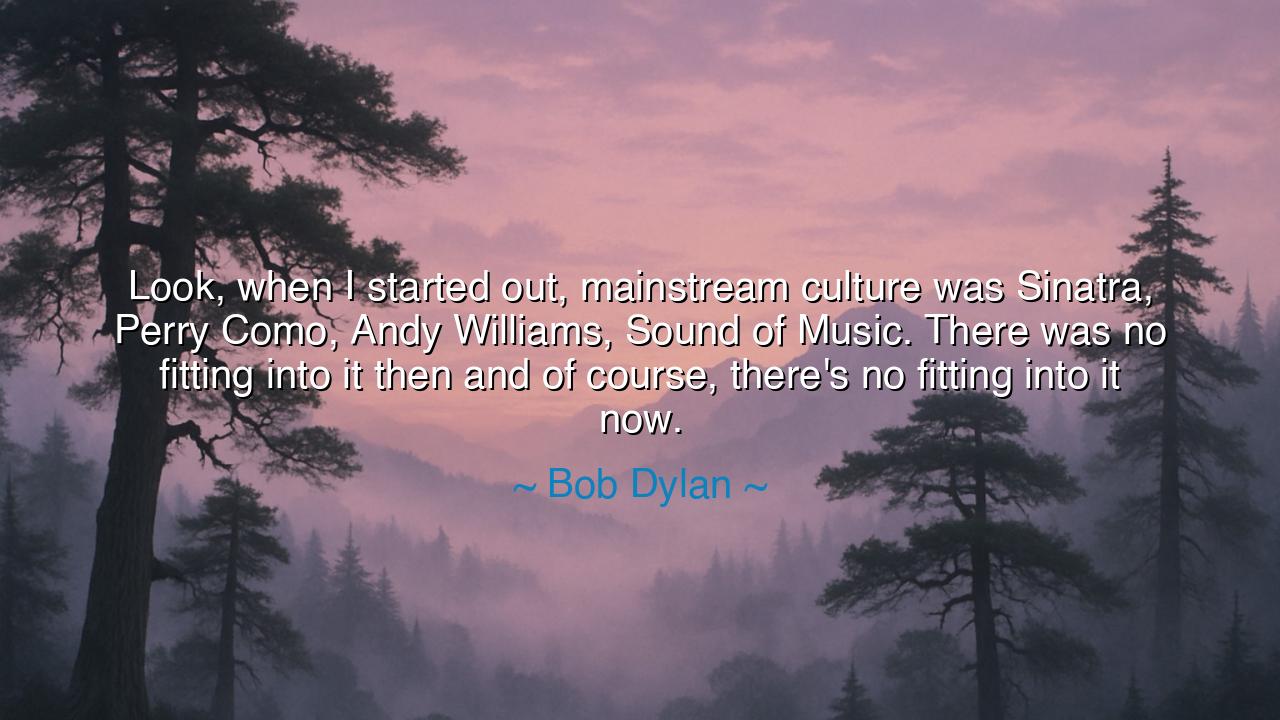
Look, when I started out, mainstream culture was Sinatra, Perry
Look, when I started out, mainstream culture was Sinatra, Perry Como, Andy Williams, Sound of Music. There was no fitting into it then and of course, there's no fitting into it now.






Hear the words of Bob Dylan, troubadour of truth, who said: “Look, when I started out, mainstream culture was Sinatra, Perry Como, Andy Williams, Sound of Music. There was no fitting in to it then and of course, there’s no fitting in to it now.” In this statement, he speaks the creed of the outsider, the visionary who does not walk the paved road but forges his own path through wilderness. Dylan reminds us that true art is seldom born within the safety of the mainstream, but arises instead in defiance of it, as a new voice, startling and strange, until the world is forced to listen.
The names he invokes—Sinatra, Perry Como, Andy Williams, the songs of Sound of Music—represent the polished surface of mid-century American culture. These voices were smooth, gentle, crafted for comfort and harmony. They were the soundtrack of a generation that longed for order after war and sought beauty in familiar forms. Yet Dylan, with his cracked voice and his unpolished guitar, could not, and would not, “fit in” to that world. His words were raw, his sound rebellious, his presence a reminder that art is not always meant to soothe—it is sometimes meant to awaken.
Dylan’s refusal to “fit in” echoes the lives of countless prophets and poets before him. Consider Socrates, who refused to conform to the expectations of Athens, instead questioning and unsettling those around him. He, too, did not “fit in,” and for this he was condemned, though his teachings endure to this day. Or think of Van Gogh, whose art clashed with the styles of his time; he died in obscurity, yet now the world calls him a master. So it is with Dylan: the one who dares to create outside the boundaries of mainstream culture often suffers misunderstanding in his age but becomes immortal in ages to come.
In Dylan’s time, the smooth ballads of Como and Williams were the music of dinner tables and living rooms, but they did not speak to the discontent of a younger generation. Dylan’s songs—of protest, of freedom, of change—were born of restlessness. They carried the dust of the road, the cries of the oppressed, the voices of the unheard. While mainstream culture sang of romance and nostalgia, Dylan sang of justice, of war, of civil rights. His work stood as proof that to not “fit in” was not failure, but the very essence of his mission.
The deeper meaning of his words is this: art that seeks only to conform is forgettable. Art that refuses to bend to the fashions of the time, that insists on its own vision, becomes eternal. Dylan could not fit into the culture of Sinatra and Como, nor into later waves of commercial polish—and he chose not to. His gift to the world was precisely his difference, his unwillingness to be absorbed into the easy comfort of what was already accepted. This is why he endures, while many of his “mainstream” contemporaries have faded from memory.
The lesson, O seekers of wisdom, is radiant: do not strive to “fit in” when your spirit calls you to stand apart. The world may reject you, misunderstand you, or call you strange, but if your work is true, it will find its place in time. The path of the visionary is often lonely, but it is the path that shapes the future. Dylan’s cracked voice changed music more profoundly than all the polished crooners combined, for he dared to sing what needed to be heard, not what was easy to hear.
So, O children of tomorrow, take Dylan’s teaching to heart. When you face the temptation to conform to the mainstream, remember that all greatness begins in refusal. Cherish your difference. Protect your vision. Do not fear if you do not “fit in,” for it may be the very sign that you are doing what is necessary. And in the end, like Dylan, your voice may rise beyond your time, carrying truth that outlasts the passing fashions of the age.






AAdministratorAdministrator
Welcome, honored guests. Please leave a comment, we will respond soon